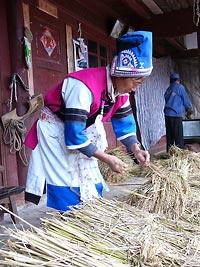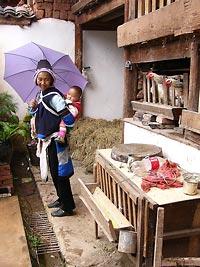Riding in a car with Richard

LIJIANG — Tuesday, October 25 — We were having breakfast in the Prague Cafe in Lijiang's old town when Richard approached us with his business card, and asked if we'd like to tour some minority villages and see a monastery.
I had been thinking about hiring a local guide for a day, and Richard's appearance - a baseball cap on backward, glasses, mustache - and his English set him apart from the government-licensed guides I'd seen around town, sitting around smoking and looking bored as their tour groups ate lunch or shopped.
I took his card and called him later that afternoon. We agreed on a price of $36, and the next morning he and a driver - dressed like the Marlboro Man in denim jacket, jeans, pointed-toe boots and a cowboy hat - met us at the town square in a six-seat Chinese minivan.
We took off into the countryside along a bumpy road that cut through potato and corn fields. When we hit State Road 215, we turned left (toward Tibet, about 350 miles down the road) and soon ended up in Jiuhe, a farming village shared by members of Naxi and Bai ethnic minority groups.
Richard, 42, and his wife, Li, grew up in Lijiang. Former English teachers, they started their tour company a few years ago. Richard's seat-of-the-pants guiding style wouldn't suit everyone. His idea is to take people into a village where he's been before, chat up the locals playing mahjong at the corner store and wrangle an invitation into someone's home. This is how we found ourselves sitting around a fire on a rainy Sunday cracking walnuts and eating sunflower seeds with the Xi family.
Their mud-brick home and barn is typical of the villages in the rural areas within an hour's drive of Lijiang. Corn and chili peppers hung to dry on the top floor. Pumpkins and squash were stored on the first floor. Mr. Xi, a furniture-maker, showed us a few of his tables, and introduced us to his wife and children, a seven-year-old daughter and a son, one-and-a-half. Soon other village children and neighbors gathered around, and my attempt to crack a walnut with the blade of a hatchet instead of the blunt end brought squeals of laughter.
The day continued with visits to several more villages. Richard's curiosity and language skills opened doors, and people invited us into their homes for tea and more walnuts.
Lunch was at a small roadside restaurant that services truck drivers on their way to and from Tibet. Then it was onto the Buddhist monastery. By now it was raining hard, and when the Marlboro Man went to start the ignition, nothing happened. The battery was dead. "Everyone get out and push," Richard suggested. "Except you lady. Sit."
Richard, my husband and the cook from the restaurant ran behind the car and pushed it down the muddy road. The engine started. We made it to the monastery where we sat around a fire in a Tibetan-style kitchen and chatted with the monks. But the driver was pressing his luck with a rapidly failing electrical system. When it was time to leave, the men had to push the car again to jump-start it. This time it took three tries.
The car stalled for the final time at a traffic signal at a busy intersection in downtown Lijiang. The driver got out and walked off. We took a taxi the rest of the way.
Experienced China travelers have an expression they use in situations like this. "Oh well,'' they say, shrugging their shoulders. "This is China."


Travel planning
Links to some useful trip-planning sites:
Armchair travel
"River Town,'' Peter Hessler. A former Peace Corp volunteer writes of experiences teaching in a small town in the Sichuan province in the mid-1990s as its people begin to cope with sweeping social and economic changes.